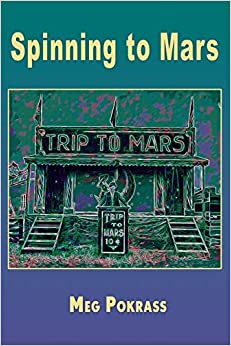|
The Breadcrumbs widget will appear here on the published site.
By Alex Carrigan Microfiction carries the challenge of conveying as much information or hinting at deeper implications as possible in as little as one paragraph. It's genuinely a talent to be able to give the reader a look into the mind and state of the narrator of a microfiction piece with so few words. To build a collection of microfiction would require the author to figure out the best way to draw all these short pieces together and find some sort of throughline that can hint at greater meanings. In her latest microfiction collection, Spinning to Mars, Meg Pokrass presents nearly 70 one-page stories. While they may seem disconnected, it's hinted that the pieces may be part of one larger narrative. Even if they're not, Pokrass' pieces do convey some fascinating and complex layers that touch on a variety of themes. The first commonality in the collection is the references to the narrator's parents. The first few stories discuss the fathers and mothers of the protagonist. Some suggest that the father is no longer in the picture, either due to his death or abandonment of the protagonist, while the mother may not have been the most comforting or emotionally supportive figure. These often blur into nostalgic moments that carry some bitterness and regret, such as "Lost Marbles" where a discussion about the father's antique marble collection reveals some less-than-ideal thoughts from the narrator and their mother. Or like in "Hitting Back," which opens with the mother talking about the father in a memorable, yet odd setting: Her mother, saltier than anyone else’s mother, sitting on the toilet seat, door ajar, talking freely about how she had never been loved. How her father, in the early days of their courtship, had probably been the closest call. While many of the pieces in Spinning to Mars discuss the failure or disappointment of parental affection, others discuss how that can be replaced with either new romantic relationships, or animal companionship. Some are sweet, like in "Mountain Gorillas" which describes a relationship in moments like "You’d make silly grunting noises to each other over yogurt in the morning. Would wake up like tired middle-aged zombies after eating too much Chinese takeaway." Other show relationships on a decline, such as in "Junkie" where the middle-aged espresso addicted protagonist describes their declining marriage by stating, "The husband and you were a great comedy team, until he stopped laughing. Now you’re a coffee-addicted person who can still ruin men’s lives just by staying so funny and young-spirited." In terms of animal companionship, cats are a recurring element throughout the collection. In Pokrass's tales, cats are either symbols of the start of a relationship ("Wonderful Cats"), emotional support during a relationship ("Cat Displacement," "Efficiency"), or a sign of life changing ("Rust," "Time," "Separation"). Some, like "Between Animals," even have the cats be an important figure of the non-POV characters in the stories. Cats are this symbol of love and care, and the pieces in the collection seek to show many ways the cats can be viewed as such. Finally, what Pokrass' collection returns to is the power of nostalgia and imagination. While neither nostalgia and imagination fully satisfy the narrator of the piece, they do provide some escapism and hope throughout. The father figure in some pieces may not have been the best, but the narrator can recall decent memories. Movies come up a few times to show how they can better visualize or relate these memories to works of art. There's also the fantasy of traveling to Mars which opens and closes the collection, representing one of the ultimate fantasies and hopes for mankind, just filtered through the imagination of these single characters. Spinning to Mars is a complex collection told in some of the fewest words. Whether or not the pieces are truly connected, they do convey some universal ideals about longing for better, seeking affection and comfort, and accepting and growing. It may take a few reads through the collection to fully understand Pokrass' work, but at the same time, it may be one that can never be fully understood because it only presents part of the experience, leaving a mystery that may only exist in the white spaces on each page.
0 Comments
CommentsYour comment will be posted after it is approved.
Leave a Reply. |
AuthorWrite something about yourself. No need to be fancy, just an overview. Archives
July 2024
Categories
All
|



 RSS Feed
RSS Feed






